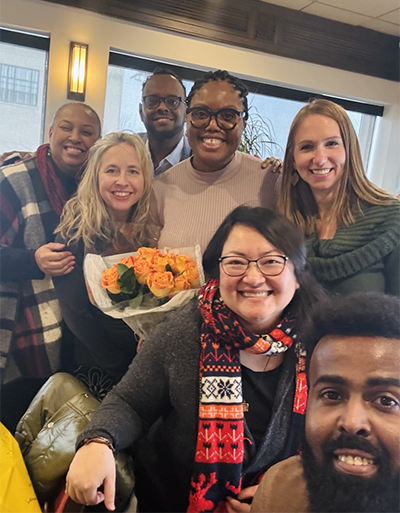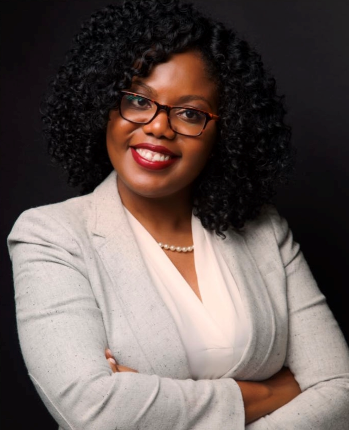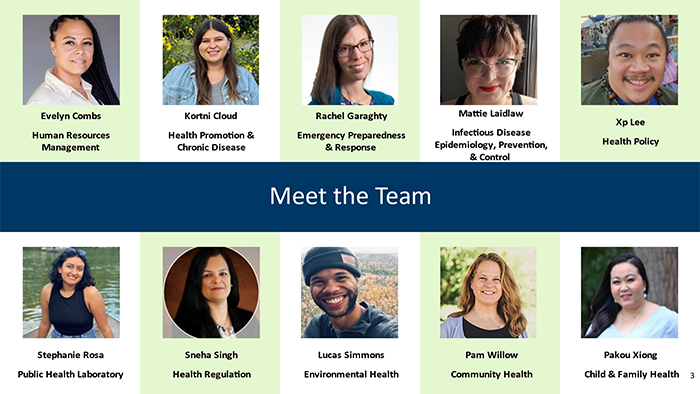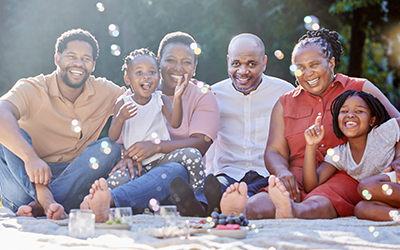Center for Health Equity Newsletter - February 2024 
In this newsletter:
Greetings from the Center for Health Equity
Message from the Director
CONNECT: MDH launches new health equity strategist model across agency
STRENGTHEN: New grant opportunities focused on advancing equity
AMPLIFY: Centering people with disabilities: A catalyst for health equity
Greetings from the Center for Health Equity

Once again, we have exciting updates to share since our last newsletter! Last month, Odichinma (Odi) Akosionu-DeSouza joined our team as the new director of the Center for Health Equity. Odi brings a rich background in equity research and translating evidence into effective solutions. We look forward to adding her knowledge and leadership to our work advancing equity across Minnesota. Learn more about Odi through her brief biography on our Contact Us page, and through her very first Message from the Director below.
We have also welcomed new partners to both the Health Equity Advisory and Leadership (HEAL) Council, which supports MDH in advancing equity in its programs and policies, and the Community Solutions Advisory Council [EXPIRED LINK], which advises CHE on our Community Solutions for Healthy Child Development grant program. More information about both councils and their membership can be found on the program webpages.
As we mentioned in our November newsletter, the Center for Health Equity, which was created in 2013 to advance health equity, has grown dramatically from about a dozen staff in 2020 to approximately 50 today. Recognizing this growth and the center’s role in providing support and technical assistance across the agency, the executive office has elevated the Center for Health Equity to a division at the Department of Health. With this structural change, we will also be changing our name to the Division of Health Equity Strategy and Innovation. Stay tuned for an official announcement to come!
We’re also happy to share with our readers about a new equity model launched across the department in 2023, as well as multiple new funding opportunities focused on advancing equity across our communities. Read on to learn more!
[Interested in being a guest writer for a future newsletter? Email your idea to health.equity@state.mn.us and we will be in touch!]
Message from the Director

I cannot believe it has been almost a month already in my new role. I still remember my first day like it was just yesterday. Walking into the Freeman Building, picking up my laptop where I already had about fifteen emails offering me congratulations that were waiting for me to read through. I am beyond grateful for the warm welcome from all the MDH staff I have met so far.
As I shared with our division leadership and our teams, I recognize and embrace this season of discovery – learning about all the amazing work the Center of Health Equity has accomplished is critical to figuring out the best ways we can continue to grow and expand our work as the new Health Equity Strategy and Innovation Division. There is much to take in and understand, and it is important for me to listen first and be present, asking questions to decipher where the next opportunities are for strengthening partnerships and to support our communities.
In this moment, I also want to lift up those who came before me and laid the groundwork for the work we are yet to do. The exponential growth of the Center for Health Equity wouldn't have been possible without them, and for that I am grateful.
Odichinma (Odi) Akosionu-DeSouza I am also mindful that building systems that disrupt the status quo is a long road filled with challenges and opportunities. How we view the challenges we face as we transform systems will determine how far we can go. Understanding that change starts with us, those who have been called and have chosen to do this work.
In the meantime, it has been an absolute delight getting to know our division staff, the Health Equity Bureau staff, and MDH leadership. It is awesome that I got to be here to help welcome the new directors for the Office of American Indian Health and the Office of African American Health, as well as the Health Equity Strategic Administrative Manager. I have also had the pleasure of meeting the new Health Equity Advisory and Leadership (HEAL) Council members, as well as our Community Solutions Advisory Council [EXPIRED LINK] members.
I look forward to continued conversations on how to strengthen partnerships, center those at the margins to support the implementation of community-led recommendations, and promote health equity within all communities in Minnesota.
Odichinma (Odi) Akosionu-DeSouza
Division Director
CONNECT
[We are a network hub – leading, connecting and strengthening networks of health equity leaders and partners across MDH and Minnesota communities.]
MDH launches new health equity strategist model across agency

As part of its commitment to advancing equity, the Minnesota Department of Health launched a new and innovative model in 2023 for connecting, strengthening, and amplifying health equity efforts across the agency: health equity strategists. These strategists are a dynamic team of 10 health equity champions who are embedded simultaneously within the Center for Health Equity and within divisions across MDH.
“The health equity strategist model is essential to MDH’s work to advance racial and health equity,” said Marisol Chiclana-Ayala, the health equity strategist team supervisor in the Center for Health Equity. “The strategists bring knowledge and expertise, share resources and tools, and provide equity training opportunities and other capacity building opportunities to each of their divisions.”
The primary function of the strategists is to support division leadership in identifying health equity priorities and integrating equity strategies into the work of the division. This could include policy and systems change, trainings, providing expert guidance in authentic community engagement practices, or facilitating equity and racial justice discussions to improve staff understanding of these issues and transform narratives.
Chiclana-Ayala led the hiring and onboarding of the 10 health equity strategists in partnership with leaders from across MDH divisions in the summer and fall of 2023. Since then, the strategists have begun diving into the work of their divisions and supporting cross-agency equity initiatives.
“My favorite part of being a health equity strategist so far has been learning about all the great work going on across MDH,” said Xp Lee, health equity strategist for the Health Policy Division. “It’s really exciting and energizing and gives me a lot of hope that we’ll keep all the momentum going as we keep making Minnesota a truly healthier place for all.”
Lee explained that this model is groundbreaking in that it’s the first time MDH has had staff dedicated to health equity who are based simultaneously within the Center for Health Equity and within divisions across the agency. Being able to leverage resources from both the center and their home division will enable them to more effectively connect equity work happening and resources available across the agency to build capacity within our staff, structures, and systems “to continuously and effectively identify, create, incorporate, achieve, and reflect on our health equity goals.”
The Health Equity Bureau Performance and Research Section, with support from staff and leadership across the agency, is working closely with the team to design and conduct an evaluation of the health equity strategist model to document lessons learned as the work progresses. The Performance and Research Section will use the results of this evaluation to inform the work of health equity strategists in their respective divisions.
Pam Willow, who started as the health equity strategist for the Community Health Division in August 2023, shared that she believes equity is based on trusted relationships. She spent part of her first few months in the role building the foundation for these relationships with staff in the division by meeting with each and every employee individually.
“It was a lot, but 100% worth it,” Willow said. “It was very rewarding on a personal level, and I see these connections already reaping benefits for the equity work in the division. I feel hopeful and motivated by the interest staff have shown so far and the wisdom and experiences they have shared with me.”
For the Community Health Division, Willow will play a lead role in the development of a division-wide equity plan that will create the framework for the work of the division moving forward.
Learn more about the talented personalities that make up the health equity strategist team on the Center for Health Equity Contact Us page.
STRENGTHEN
[We provide leadership in advancing health equity and cultivate health equity leaders within MDH and across Minnesota communities.]
New grant opportunities focused on advancing equity 
The Health Equity Bureau has released several new grant opportunities in recent months aimed at advancing equity in our communities. These programs were funded through the 2023 state legislative session.
Two of the grant programs are based within the Center for Health Equity and focus on equity across cultural communities: the brand-new Capacity Strengthening Initiative and the continuation of the Community Solutions for Healthy Child Development Grants.
The Capacity Strengthening Initiative is a groundbreaking new program established to empower and uplift the ability of community organizations to receive state funding. The initiative focuses on supporting community-based organizations and faith-based groups that serve people of color, American Indians, LGBTQIA+ communities, and people with disabilities. Part of this initiative includes one-time grants to these groups to strengthen their organizational capacity.
“The Capacity Strengthening program is crucial for enhancing organizational capabilities, fostering partnerships, and addressing health inequities across metro and rural Minnesota communities,” said Saurav Dahal, supervisor of community grants and capacity building at CHE “This groundbreaking initiative empowers community and faith-based organizations by providing tailored resources and training, funding, and ensuring they can maximize their impact within the communities they serve.”
The request for proposals (RFP) for this initiative, which was released in October 2023 and made approximately $1.8 million available through multiple grant awards, was met with an overwhelming response from community organizations. CHE received a record number of applications – 300 in total requesting more than $27 million altogether. The Center for Health Equity is currently in the final steps of the application review process and expects to notify applicants of funding decisions before the end of the month.
The Community Solutions grants, on the other hand, already had an inaugural round of grants from 2020-2023, but this was cohort was set up as a one-time pilot program. After the pilot demonstrated how the program fills a critical gap in disparities in early childhood outcomes among communities most impacted, including Black, American Indian, and other minority communities, the 2023 legislature decided to continue to provide funds for the program long-term.
The RFP for Community Solutions was released in early January with applications due by Feb. 14, 2024. The review committee, which includes members of the Community Solutions Advisory Council, will evaluate all eligible and complete applications received by the deadline and expects to notify applicants of their decision in April.
Outside the Center for Health Equity, two other notable new grant opportunities have been released – the American Indian Health Special Emphasis Grant and the Paths to Black Health Grant (also known as the African American Health Special Emphasis Grant Program in state statute). Both of these grant programs were established by the state legislature just last year and focus on advancing equity for specific priority communities.
Kris Rhodes, the new director of the Office of American Indian Health, shared that the special emphasis grants for American Indian communities released its inaugural RFP in December 2023. "This funding encourages American Indian tribal nations and urban organizations to look to tribal wisdom and community solutions to address the health challenges that our communities face today,” Rhodes said. “I trust that our communities know best."
As for the Paths to Black Health grant, which also released its first RFP in December, the program aims to invest in community solutions to enhance the vibrant and thriving African American community in Minnesota. This investment has the ultimate goal of in reducing health disparities arising from cumulative and historical discrimination and disadvantages in multiple systems, as well as historical trauma.
“What makes the Paths to Black Health grant groundbreaking is its intentionality,” said DaVonna Rucker, the new director of the Office of African American Health. “It doesn’t use covert language to minimize or generalize the trauma experienced by African slave descendants born in the U.S. It is a call to action to acknowledge these inter-generational disparities and work to eradicate them. This grant is significant because it redistributes resources back into the Black community to allow autonomy in its own healing.”
For more information about funding opportunities from the Health Equity Bureau, visit the Health Equity Funding Opportunities page.
AMPLIFY
[We amplify the work of communities most impacted by health inequities and support them to drive their own solutions.]
Centering people with disabilities: A catalyst for health equity 
by Annika Grassl and Rachel Garaghty
In the pursuit of health equity, the Minnesota Department of Health (MDH) recognizes the pivotal role of people with disabilities in informing the public health system’s work in communities. Embracing disability as an inherent aspect of human identity and life journey, MDH is committed to safeguarding and enhancing the health of Minnesotans with disabilities while addressing the complex intersectional challenges they face.
The adoption of the new MDH Data Standards in the fall of 2023 marked a significant milestone, reflecting the culmination of community-led efforts to systematically capture data on disability. Through collaboration with people with disabilities and their organizations, the structure and terminology of demographic questions were shaped to ensure that data collection is inclusive and reflects diverse identities within communities.
MDH continues to prioritize inclusivity by contracting organizations led by and serving people with disabilities, such as COVID-19 Community Coordinators. These coordinators facilitate vaccine and testing clinics tailored specifically for people with disabilities in trusted community spaces and connect people with disabilities to resources for health recovery. Additionally, the MDH In-Home Vaccine Program ensures that vaccinations are accessible to Minnesotans and their caregivers in the comfort and safety of their homes.
In September 2023, the MDH Children and Youth with Special Health Needs (CYSHN) Section hosted the Supporting Family Caregivers Forum, bringing together over 100 caregivers, family support organization staff, nonprofit personnel, health care professionals, policy makers, and state agency staff. The focus was on how Minnesota can support family caregivers of children and youth with special health needs and disabilities across multiple sectors. Attendees delved into the 2023 National Strategy to Support Family Caregivers [EXPIRED LINK] and explored ways to support and learn from caregivers regarding decisions affecting them and their family members.
Elevating community input is paramount in developing policies and programs that effectively address the unique needs and experiences of people with disabilities. MDH acknowledges the importance of communities in shaping initiatives that promote health equity and dismantle systemic barriers. At the same time, we recognize the intersecting and often compounding disparities faced by marginalized communities, including people of color and American Indians with disabilities.
Centering the lived experiences of people with disabilities can serve as a catalyst for dismantling barriers and fostering comprehensive health equity. By prioritizing intersectionality and actively engaging with the community, MDH aims to create a more inclusive society where every individual, regardless of ability, can thrive.
Annika Grassl is an equity communications specialist and a member of the disability equity team in the Center for Health Equity at the Minnesota Department of Health. Rachel Garaghty is a health equity strategist and a co-chair of the Minnesota Employees with Disabilities employee resource group at the Minnesota Department of Health.